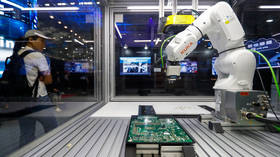China calls on rich countries to share AI

China has slammed the US over its latest artificial intelligence (AI) export control restrictions, describing them as an “obstacle strategy” aimed at depriving Beijing and other nations of their right to technological progress.
Guo Jiakun, spokesperson for the Chinese Foreign Ministry, said on Tuesday that AI is a shared asset for all humanity and should not be turned into a “game for wealthy countries and individuals,” used to create “development divides.”
“In order to maintain its hegemony, the US is imposing hierarchy in the AI field based on countries’ proximity with Washington,” Guo told a regular news briefing in Beijing. “The fundamental purpose is to deprive a large number of developing countries, including China, of the right to technological progress and development.”
His remarks followed the release by US President Joe Biden’s administration of an “interim final rule on artificial intelligence diffusion” which, the White House said, is designed to help “thwart smuggling,” close loopholes, and raise AI security standards.
The new regulations tighten restrictions on AI chips and technology exports, capping the number of AI chips that can be exported to most countries. They also grant unrestricted access to American AI technology for Washington’s key allies, while maintaining a block on exports to China, Russia, Iran, and North Korea, according to Reuters.
“Even as it encourages the diffusion of US technology, the rule takes significant steps against countries of concern, constraining them from accessing advanced AI systems and the computing power used to train them,” a White House fact sheet said.
Guo branded the measures an “obstacle strategy” that runs counter to the common interests of nations in developing AI. He added that the move has raised concerns across multiple sectors about the US potentially igniting a “new technology Cold War.”
He noted that China will continue to work with all countries to promote openness “without erecting walls.” According to him, Beijing aims to foster a “non-discriminatory” environment for AI development, ensuring that its benefits are accessible to everyone.
The Biden administration has intensified its crackdown on AI chip exports, building on a 2023 ban on the sale of advanced chips to China. In December, the measures were further expanded to include 140 entities, including manufacturers of semiconductor equipment.
Meanwhile, company executives, including Nvidia Vice President Ned Finkle, have criticized the outgoing administration for pushing in a “last-minute policy,” claiming the export restrictions could backfire.
Finkle warned last week that limiting sales of AI chips could “harm the US economy, set America back, and benefit adversaries.”














